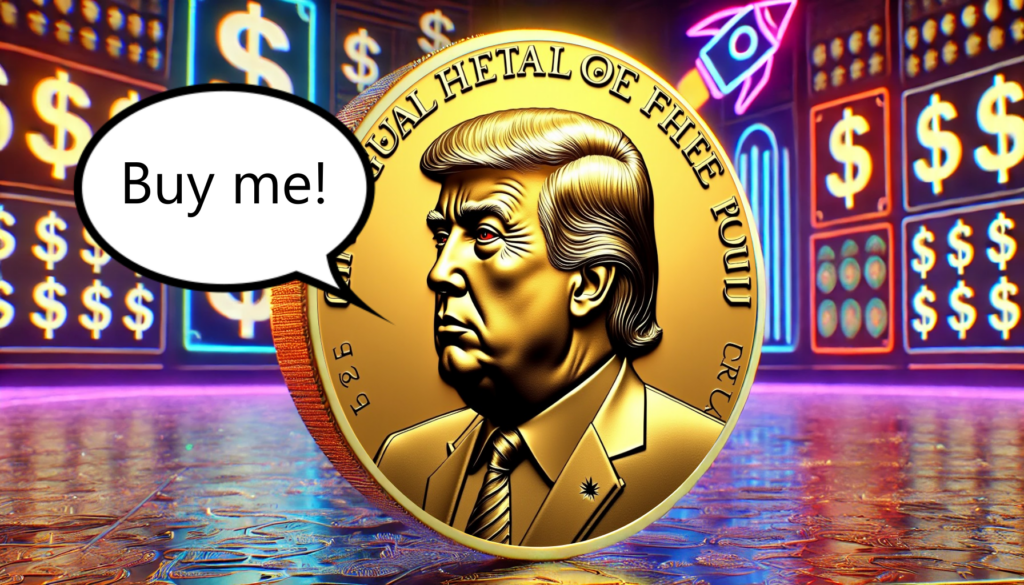The volatile world of meme coins continues to captivate and confound. Newly-(re)minted U.S. President Donald Trump recently launched his own cryptocurrency, $TRUMP, which has people wondering how these currencies actually work.
Meme coins are a type of cryptocurrency inspired by internet memes, characters, or trends. They are typically supported by enthusiastic online communities and are generally intended to be light-hearted and fun. The first meme coin, DOGE, was released in 2013 as a joke meant to poke fun at the wild speculation in cryptocurrency markets at the time. Meme coins are usually more volatile than other blockchain-based cryptocurrencies.
This article aims to summarize the launch of $TRUMP and contrast it with another recent meme coin, $HAWK, which is currently facing a class action lawsuit and accusations of being a “pump and dump” scheme.
$TRUMP Cards
Donald Trump introduced $TRUMP to fanfare from his supporters, rapidly driving its market capitalization to nearly $6 billion. Positioned as a meme coin, $TRUMP aims to capitalize on Trump’s brand and the viral nature of digital tokens to drive value. Simultaneously, Melania Trump launched $MELANIA, another meme coin purchasable through both fiat and crypto methods. Despite the speculative nature of such coins, $TRUMP gained traction, bolstered by its connection to Trump’s official platforms and CIC Digital LLC, the company behind his previous NFT ventures. The coin’s roadmap includes an ambitious issuance schedule of one billion tokens over the next three years.
This is not Trump’s first foray into cryptocurrency, having last August released a fourth series of $99 digital trading cards, called “Series 4: The America First Collection,” featuring NFT designs like “SuperTrump” and “crypto president.” The release includes high-priced packages offering perks such as autographed memorabilia, dinners, and gala tickets for buyers spending up to $24,750 in cryptocurrency. Trump claims past NFT releases have generated over $4 million per drop, though his earnings remain unclear.
Et tuah, Brute?
To see an example of a meme coin gone wrong, we must look no further than internet personality Haliey Welch’s foray into cryptocurrency with $HAWK. Welch, who rose to fame through viral interviews and social media, saw her coin’s value skyrocket to a $500 million market cap before plummeting by over 90%. Accusations of a “pump-and-dump” scheme involving her collaborators Alex Larson Schultz and Clinton So have sparked a class-action lawsuit, though Welch herself is not named as a defendant.
The lawsuit claims Welch’s fame was exploited to attract inexperienced investors, and reports suggest she received a significant payout to promote the coin. Her silence during a Twitter Spaces discussion on the controversy and her subsequent retreat from public view have only deepened the fallout.
Analysis
Given how things shook out with $HAWK, doubtlessly people (like myself!) are wondering if the TRUMP coin will end up the same way. Admittedly, it seems unlikely for a sitting President – who I’m watching get inaugurated as I write this – to willingly defraud Americans for financial gain. Memecoins have seen genuine success in the past, such as DOGE, and, as long as the value holds up, there would be no reason for a similar class-action suit to be launched.
However, other ethical concerns around $TRUMP remain. Government watchdogs have criticized the move due to the possibility of foreign governments buying the coin and enriching Trump, which would likely violate the Constitution’s foreign emoluments clause. Former White House Communications Director Anthony Scaramucci posted on X, stating that “Now anyone in world can essentially deposit money into bank account of President of USA with a couple clicks.”
Jordan Libowitz, vice president for communications at the nonprofit Citizens for Responsibility and Ethics in Washington had this to say about the topic:
“After decades of seeing presidents-elect spend the time leading up to inauguration separating themselves from their finances to show that they don’t have any conflicts of interest, we now have a president-elect who, the weekend before inauguration, is launching new businesses along with promises to deregulate … those sectors in a way to just blatantly profit off his own presidency.”
Others have noted that the timing of the launch – after the end of the Presidential campaign and only days before the inauguration – seems designed to dodge federal ethics rules that would apply to the President.
While there is clearly a lot of controversy surrounding the launch of $TRUMP, it seems that it will be a financial success for the 47th President, at least in the short term. And, with deregulation being a core tenet of his campaign, it seems unlikely that regulators will interfere. I doubt that we’ll see $TRUMP or $MELANIA going anywhere anytime soon, and more people around Trump have continued to launch their own meme coins, such as Pastor Lorenzo Sewell, who launched $LORENZO only hours after delivering a prayer at the inauguration.
These contrasting stories highlight the speculative and unpredictable nature of meme coins. For Trump, $TRUMP represents another addition to his portfolio of enterprises catering to his loyal base, but with questions around the ethics of a sitting President operating such a venture. For Welch and her associates who are named in the suit, $HAWK serves as a stark reminder of the reputational and legal perils that can arise when fame intersects with volatile financial markets. Both cases underscore the need for caution, transparency, and accountability in an industry that thrives on hype and speculation.




